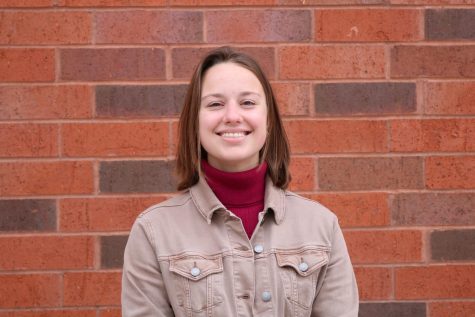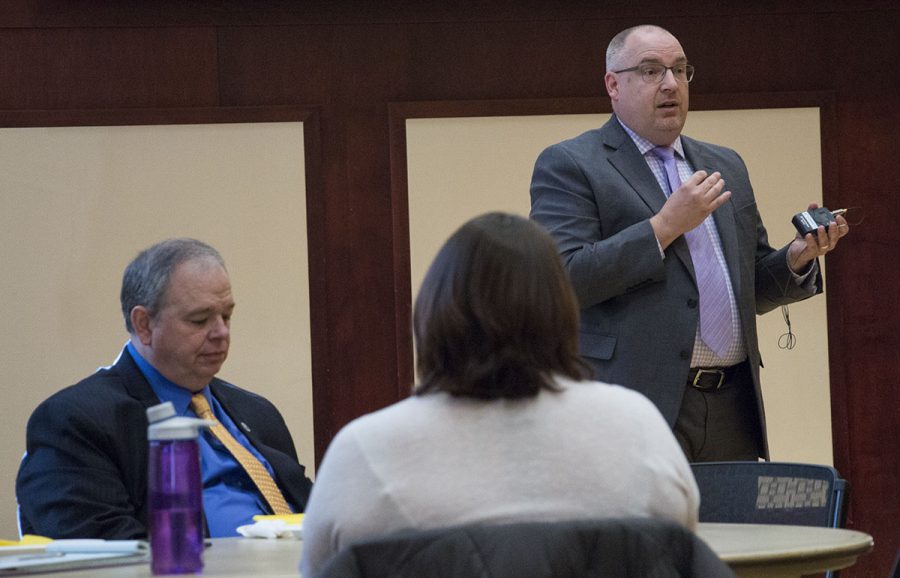Roundtable addresses accessibility
Students ask about safety, housing and transportation for those with differing abilities
Photo by Clara Neupert
Director of Housing and Residence Life Quincey Chapman responds to student inquiry during the Chancellor’s Roundtable on Wednesday. The meeting was an open forum for discussion about accessibility on UW-Eau Claire’s campus.
Accessibility at UW-Eau Claire — impacted by the topography and geography of the campus — has room for improvement, university leaders said in response to student questions during the Chancellor’s Roundtable on Wednesday.
“We recognize that we have a long way to go to make the campus accessible for everyone,” said Michael Rindo, the assistant chancellor for facilities and university relations at UW-Eau Claire.
Rindo was joined by Chancellor James C. Schmidt; Director of Housing and Residence Life Quincy Chapman; Dr. Tamara Johnson, the vice chancellor for equity, diversity and inclusion and student affairs; and two representatives from the Services for Students with Disabilities office.
At the start of the meeting, Schmidt opened the floor for student inquiry about accessibility on campus. The concerns shared addressed safety, housing and transportation.
Emily Shepardson, a third-year resident assistant, shared Dr. Katherine Schneider’s experience.
Schneider is a former clinical psychologist, writer, activist for accessibility and blind. She told Shepardson she requested the placement of rumble strips at the end of the newly-renovated Garfield Avenue walkway. Rumble strips signal to a person who is blind or visually impaired that they are entering ongoing traffic. The absence of the rumble strips at this location is a safety hazard, Shepardson said.
In his response, Rindo said his office had taken Schneider’s request into consideration but decided to leave Garfield Avenue without rumble strips, as per safety recommendations by the Americans with Disabilities Act and the City of Eau Claire.
Placing rumble strips at the end of the Garfield Avenue walkway, Rindo said, would signify to a walker that they are entering a roadway with a sidewalk on the other side of the street, which isn’t the case.
Shepardson said she thinks the university could benefit from including Schneider in the conversation about a solution to the problem.
“I think there should be some sort of compromise because the (rumble strips aren’t) safe and leaving the way it is I don’t think is safe,” Shepardson said.
Rindo said he didn’t know if there is a compromise for the issue.
Johnson said she understood the validity of the recommendations Rindo cited, but said value should be placed in the opinion of a person, like Schneider, with lived experiences.
“There might be room to revisit (the issue) with her in the room,” Johnson said.
Student Body President Branden Yates asked about accessibility to residence halls, noting that Putnam Hall and Katherine Thomas Hall, both on lower campus, will be replaced by the new science building in the future.
Chapman said Aspenson Mogensen Hall is the most accessible residence hall to date, with an elevator, an electronic door and five rooms specifically designed for people who use wheelchairs or other walking assists.
The university currently operates two vans for student transportation between upper and lower campus, Chapman said. There are zero vans with wheelchair accessibility, but the university hopes to purchase one in the future to combat the barrier the campus hill creates.
Several students asked about the accessibility of the McPhee Strength and Performance Center, especially for people who utilize wheelchairs. Students said weight racks and other exercise equipment are sometimes difficult to access because of their close proximity.
The Sonnentag Event and Recreation Complex, a facility still in the planning process, will be more accessible for everyone looking to exercise, Rindo said. The Sonnentag will replace Zorn Arena. The Complex would be on lower campus; therefore without the barrier of the hill.
For now, students with differing abilities who want to exercise or travel between upper and lower campus have to seek accommodation individually, Schmidt said.
In the future, Schmidt and Chapman said the university’s newly-constructed buildings, both residential and academic, will accommodate all abilities. The Services for Students with Disabilities office works with students before their arrival on campus and during their time on campus to ensure their needs are met.
“In an ideal world, there should be absolutely no barrier,” Schmidt said. “Students shouldn’t have to seek accommodation, the design should already be there.”
The next Chancellor’s Roundtable is from noon to 1 p.m. on Nov. 28 in the Dakota Ballroom of the Davies Student Center. The topic will be decided at a later date.
Neupert can be reached at [email protected].

Neupert is a fourth-year journalism student at UW-Eau Claire. She is the executive producer of Engage Eau Claire on Blugold Radio Sunday. In her spare time, Neupert's working on becoming a crossword puzzle expert.

